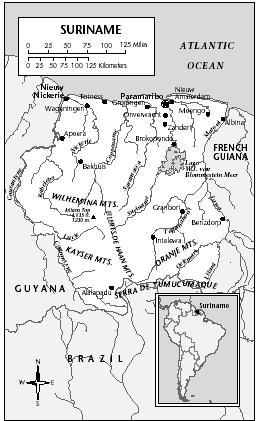Suriname - History
Spaniards came to Suriname in the 16th century in search of gold, but did not stay when they found none. The first large-scale colonization took place under Francis, Lord Willoughby, the English governor of Barbados, who sent an expedition to Suriname in 1650 under Anthony Rowse. In 1660, the British crown granted Willoughby official rights, and it became a flourishing agricultural colony. Settlers included English colonists, African slaves, and Jewish immigrants from the Netherlands, Italy, and Brazil. In the Peace of Breda between England and the United Netherlands in 1667, Suriname became a Dutch colony.
The English held Suriname again between 1799 and 1802 and from 1804 to 1816, when the Dutch resumed control over the colony under the Treaty of Paris. With the final abolition of slavery in 1863, workers were imported from India, Java, and China. In 1954, a new Dutch statute provided for full autonomy for Suriname, except in foreign affairs and defense. A commission was set up on 5 January 1972 to prepare alternatives to the existing legal framework. In May 1974, the terms for Suriname's independence were agreed on, and Suriname became an independent country on 25 November 1975.
For five years, Suriname was a parliamentary republic under prime minister Henk Arron. On 25 February 1980, the government was overthrown in a military coup led by Désiré Bouterse. Parliament was dissolved and the constitution suspended, and in 1981 the new government declared itself a Socialist republic. Relations with the United States became strained as the Bouterse government moved closer to Cuba. In December 1982, as a result of the government's execution of 15 political opponents, the Netherlands and the United States suspended all aid to Suriname.
The military and Bouterse continued to rule through a succession of nominally civilian governments. Still, pressure mounted for a return to genuine civilian rule. A separate challenge to the government came from a guerrilla movement under the leadership of Ronny Brunswijk. The Surinamese Liberation Army (SLA), also known as the Maroon or Bush Negro insurgency, began operating in the northeast in July 1986. It struck various economic targets, including the Suriname Aluminum Company. The government responded with repression, killing civilians suspected of supporting the insurgency.

The military allowed for elections on 25 November 1987. An anti-Bouterse coalition, the Front for Democracy, won 80% of the vote and 40 of the 51 seats in the newly constituted National Assembly, but a new appointive State Council, rather than the elective National Assembly, was given law-making authority. The new president, Ramsewak Shankar, remained in office from 25 January 1988 until 24 December 1990, when the military once again took over. International pressure mounted, and the military soon relented, allowing for elections on 25 May 1991. Again, an anti-military coalition, called the New Front (NF), swept the election. The leader of the coalition, Ronald Venetiaan, was chosen president on 6 September 1991. Bouterse was forced to resign his post as army commander in 1992, but he retained his political influence by becoming president of the National Democratic Party (NDP).
Although Venetiaan managed to remain in office throughout his five-year term, severe economic difficulties leading to increased poverty for the majority of Suriname's citizens caused his popular support to decline. In the May 1996 elections, NDP candidate Jules Wijdenbosch was elected president, effectively returning Bouterse—as NDP president—to power. Nevertheless, these elections marked the first time in independent Suriname's history that power passed peacefully from one democratically elected government to another.
Wijdenbosch did not prove to be a popular president. His close association with Bouterse hurt him, both at home and abroad, as did the failure of his administration to improve Suriname's faltering economy, which continued to struggle with high inflation and unemployment, a major budget deficit, and the virtual collapse of its currency. A plan to privatize the oil and banana industries met with widespread protests culminating in a five-day general strike in the first part of June 1999. By the end of that month, popular discontent with the government had become so strong that Wijdenbosch called for early elections (which took months to arrange but still took place earlier than the normally scheduled date in 2001). In the meantime, Bouterse, sought by human rights groups for abuses during his time in power, was tried in absentia in the Netherlands for cocaine trafficking and convicted in July 1999.
The opposition New Front coalition, supported by former president Venetiaan, swept the May 2000 elections, winning 32 of the 51 contested parliamentary seats, just short of the two-thirds majority needed to select a new president. The Democratic National Platform 2000 of President Wijdenbosch sustained a staggering loss, winning only three seats, while Millennium Combination, a separate party formed by Desi Bouterse, won ten seats. New elections must be held before March 2005.
Comment about this article, ask questions, or add new information about this topic: